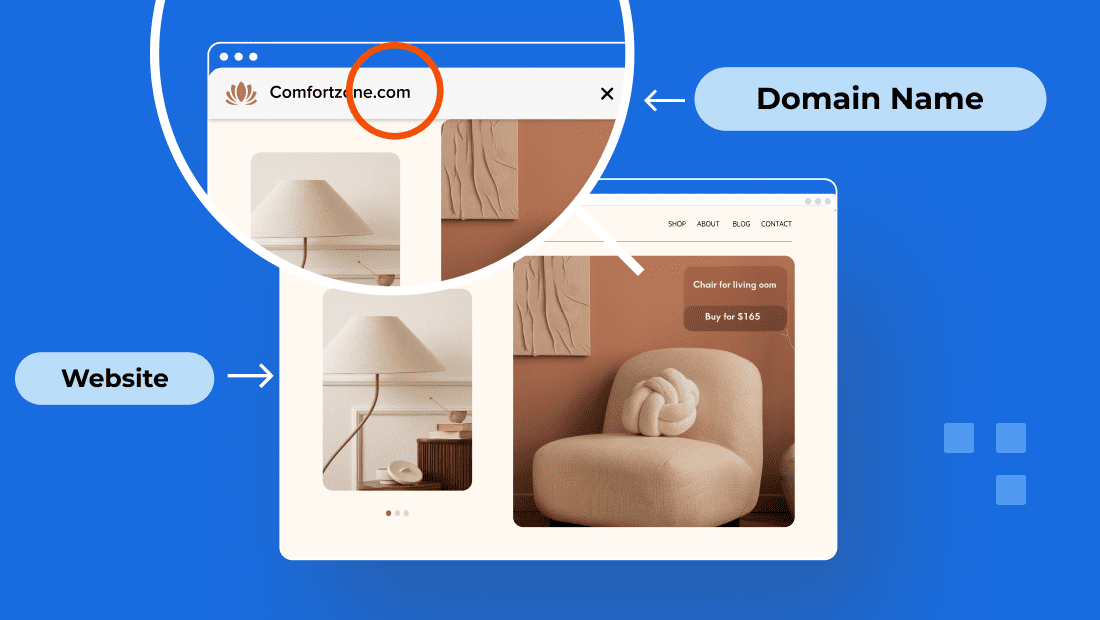Key highlights
- Know why choosing the right domain extension – like .info TLD – directly impacts your brand credibility and website visibility online.
- Learn how .info websites are cost-effective with strong domain name availability, making them ideal for informational and educational sites.
- Understand what .info domain is used for and how it helps position your site as a reliable information source with quality content.
- Explore potential downsides of the .info domain meaning, including trust issues and strategies to build reputation with .info TLD sites.
- Uncover expert tips for selecting the best .info domain name so your site is memorable and supports lasting growth online.
As a small business owner or entrepreneur, your website is your virtual storefront. Just as you would carefully choose the location and layout of your physical store, it’s essential to choose the right domain for your website. Your domain is the address that visitors use to find your website, so it’s important to make a good impression from the start.
When choosing a domain or site, it’s crucial to consider factors such as brand recognition, search engine optimization (SEO) and availability. This is where the .info domain comes in as a great option for those looking to create a website.
The .info domain is perfect for websites that provide information, such as blogs, news sites and educational resources. It’s affordable and widely available, making it a popular registration choice for small businesses and individuals.
By choosing a .info domain, you can make it clear to visitors that your website is a reliable source of information. It’s a great way to build credibility and stand out in a crowded online space.
However, it’s important to consider the potential downsides of using a .info domain. Some users may associate it with spam or unreliable websites, so it’s crucial to ensure that your website is high-quality and trustworthy.

What is a .info Domain?
A .info domain is a top-level domain extension specifically designed for informational websites and educational content.
If you’re in the process of building a website, you may be wondering which domain extension to choose. One option to consider is the .info domain extension, which has a unique set of characteristics that set it apart from other domain extensions.
Also read: The most popular TLDs
The .info domain is short for “information,” which clearly explains the .info domain meaning and makes it an ideal choice for websites that provide educational or informational content. This extension was introduced in 2001 and has since become a popular choice for a wide range of websites, from blogs to news sites to educational resources.
One of the advantages of the .info domain is that it’s widely available, meaning you’re more likely to find the domain you want with this extension than with more popular extensions such info domains such as .com or .net. It’s also affordable, making it a great option for small businesses and individuals who are just starting out with their online presence.
Despite its popularity, some users may associate the .info domain with spam or unreliable websites. However, this can be easily overcome by creating a high-quality website with valuable and trustworthy information.
In summary, the .info domain is a unique and affordable option that can be a great choice for small businesses and individuals who want to create a website that provides educational or informational content. With careful consideration and a high-quality website, the .info domain can help you stand out in a crowded online space and establish yourself as a reliable source of information in your niche.

Benefits of using a .info domain extension
When it comes to choosing a domain name for your website, there are a lot of factors to consider. One option to consider is the .info domain, which offers a number of benefits for small business owners and entrepreneurs who are just starting out with their online presence. Here are some reasons why a .info domain might be the right choice for you:
- Availability: One of the biggest advantages of the .info domain is that it’s widely available, meaning you’re more likely to find the domain name you want with this extension than with more popular extensions like .com or .net. This is especially important if you’re starting a new business or blog and need to establish your online presence quickly.
- Affordability: The .info domain is also very affordable, making it a great option for small businesses and entrepreneurs who are on a tight budget. With a .info domain, you can save money on your website expenses without sacrificing quality or credibility.
- Versatility: While the .info domain is often associated with informational or educational websites, it’s actually quite versatile and can be used for a wide range of businesses and blogs. For example, website owners might use a .info domain for a consulting business, a travel blog or an online store.
There are many websites, information sites and blogs that use the .info domain. These websites have established themselves as credible sources of information in their respective niches, proving that the .info domain is suitable for businesses and bloggers who want to build their online reputation.
If you’re considering .info domain registration, it’s important to choose the right domain name. Some expert tips to keep in mind include keeping your domain name short and memorable, avoiding numbers and hyphens and choosing a memorable domain name that reflects your brand or business. With the right .info domain name and a high-quality website, you can establish yourself as a credible and trustworthy source of information online.
Downsides of using a .info domain
When it comes to choosing a domain for your website, the .info domain extension can be an attractive option due to its availability and affordability. However, it’s important to consider the potential downsides before making a final decision.
One potential downside of using a .info domain is the perception that it may not be as trustworthy as other more common extensions like .com or .org. This can lead to user experience issues, as visitors may be hesitant to click on a .info link or provide personal information on a .info website.
Another potential downside is the potential impact on search engine optimization (SEO). While search engines like Google do not discriminate against any specific domain extension, websites with less common extensions may have a harder time building trust and credibility with search engines and users alike.
Despite these potential downsides, there are ways to overcome these challenges and make the most of your .info domain. One way is to ensure that your website content and design are professional and high-quality, helping to build trust with visitors. Another way is to focus on SEO best practices, such as optimizing your content with relevant keywords and building backlinks from reputable sources.
By considering both the benefits and downsides of using a .info domain and taking steps to mitigate any potential challenges, you can make an informed decision that’s best for your website and online presence.
Final thoughts
The .info domain is a good choice for those wanting to create a website that provides valuable information as it is affordable, widely available and offers versatility. Understanding what .info domain is used for helps in making informed decisions about domain name availability and suitability. It can be used for a range of businesses and blogs and with the right domain name and a high-quality website, it can help establish a credible and trustworthy source of information. However, some may associate .info domains with spam or unreliable websites, so it’s important to ensure that the website is high-quality and trustworthy.
The article also provides expert tips on choosing the right domain name. Grasping the .info domain meaning and considering whether .info is a good domain for your specific needs is important before deciding to use this extension.
FAQs
A .info domain name is a generic top-level domain (TLD) used for informational websites. It was introduced in 2001 as part of the expansion of the domain name system, where “info” stands for information.
A .info domain name is a good choice for your website depends on the nature of your website and its purpose. It can be a good fit for informational websites that provide information to internet users, but may not be the best choice for businesses or organizations that want to establish a strong brand identity.
Yes, you can register a .info domain name for both personal and business use. Website owners and website builders commonly choose this TLD for their desired domain name.
There are no specific requirements on who can register a .info domain name. Domain registration is open to anyone and you can check domain name availability through any registrar.
One potential downside of .info domain names is that they may not be as memorable or widely recognized as other TLDs, such as .com or .org. Additionally, some people may perceive them as less trustworthy or professional compared to more established domains.
A .info domain name itself will not directly affect your website’s SEO. However, if your website has high-quality content and relevant keywords, it can still rank well in SERPs. .info domains can be SEO friendly when used appropriately.
.info domain names are not as popular as some other TLDs, but they still have a significant number of registered domains. Many websites across the world use this generic TLD for sharing information.
Whether you should register a .info or .xyz domain name depends on your personal preferences and the nature of your website. .xyz is a newer TLD that is growing in popularity, while .info has been around longer and may be a suitable alternative for informational websites. Consider your desired domain and what best serves your audience.
Yes, the .info domain is a good domain for websites focused on sharing knowledge or resources. Many .info websites reliably provide information to internet users.
The .info TLD is used for sites intended to provide information. The domain meaning is “information,” making it ideal for educational or resource-based content.
Successful .info websites typically include educational portals, how-to guides, industry resources, news and media sites, research databases and informational blogs.
Most registrars provide WHOIS privacy protection for .info domains, helping keep registrant details secure and minimizing spam risks.
Yes, .info websites support DNSSEC, which helps protect domain infrastructure and ensure visitors reach the intended site securely.




Write A Comment